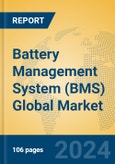Market Size
As of October 2023, the global Battery Management System market is estimated to be valued at approximately $8.6 billion, with expectations of reaching $17.2 billion by 2029, growing at a CAGR (Compound Annual Growth Rate) of around 12.3% during the forecast period from 2024 to 2029. This growth is primarily attributed to the increasing adoption of electric vehicles (EVs) and the growing need for efficient energy storage systems.Market Share & Trends Analysis
By Product Type
The BMS market can be segmented into hardware and software solutions. Among these segments:- Hardware: Holds a significant share of the market thanks to the integrated circuits, power management ICs, and communication interfaces essential for BMS operations.
- Software: Is projected to witness substantial growth due to advancements in data communication and analytics technologies enhancing system performance.
By Key Players
The competitive landscape of the BMS market is characterized by numerous key players, including:- Texas Instruments
- NXP Semiconductors
- Analog Devices Inc.
- Bourns, Inc.
- Renesas Electronics Corporation
- Infineon Technologies AG
- LG Chem
- Panasonic Corporation
- Samsung SDI
By Process
The market is segmented based on processes as follows:- Cell Monitoring: Involves continuous monitoring of individual battery cells to ensure balanced charging and discharging.
- State of Charge (SOC) Estimation: Critical for determining the remaining battery life and optimizing power usage.
- State of Health (SOH) Monitoring: Focuses on assessing the overall health of the battery to predict lifespan and maintenance needs.
By Application
The BMS market's applications can be grouped into:- Electric Vehicles (EVs): Dominates the market due to the increasing production and demand for electric cars.
- Consumer Electronics: Includes mobile phones, laptops, tablets, and other electronic devices.
- Renewable Energy Storage: Energy storage systems for solar and wind power are increasingly utilizing advanced BMS.
- Industrial: Utilizes BMS for forklifts and heavy machinery requiring efficient battery management.
By End-Use
End-use segments include:- Automotive
- Telecommunications
- Aviation
- Healthcare
- Consumer Electronics
By Region
The geographical segmentation of the BMS market includes:- North America: Leads the market, driven by the automotive and consumer electronics demands.
- Europe: Shows significant growth due to strict emissions regulations and increased EV adoption.
- Asia Pacific: Expected to grow rapidly, especially in countries like China, Japan, and India, owing to the booming electronics and automotive sectors.
- Latin America
- Middle East & Africa
Market News and Policy Update
The Battery Management System market is significantly influenced by government policies promoting electric vehicles and renewable energy. Various countries have introduced subsidies, tax credits, and incentive programs to boost EV adoption. Furthermore, regulations set by environmental agencies are pushing manufacturers to adopt cleaner technologies, further stimulating advancements in BMS.Recent collaborations among players such as Panasonic and Tesla to develop high-performance battery systems indicate a trend toward innovation. Additionally, major auto manufacturers are investing heavily in R&D for battery technologies, leading to a surge in demand for sophisticated BMS solutions.
Segment Forecasts (2024 - 2029)
Hardware Segment
The hardware segment is anticipated to maintain a dominant position in the market, projected to grow consistently at a CAGR of 11.5% . The demand for advanced battery management hardware such as ICs is expected to support this growth.Software Segment
In contrast, the software segment is estimated to outpace hardware growth at a CAGR of 15%, driven largely by the incorporation of AI and IoT technologies in battery management systems.Application-Specific Market Growth
In terms of applications, the electric vehicle segment is forecasted to experience exceptional growth, with a CAGR exceeding 18% through 2029, predominantly due to the uptake of electric mobility solutions across various regions.Regional Insights
Regions like Asia Pacific will experience the highest growth rate, attributed to the escalating demand for EVs and the competitive pricing of electronic products in this region. North America is expected to maintain significant market share through continual investments in battery technology and a strong push for renewable energy solutions.Conclusion
Overall, the Battery Management System market is poised for robust growth over the next several years. Factors such as technological advancements, supportive government policies, and increasing applications in electric vehicles and renewable energy sectors are driving this progress. Stakeholders and industry participants must remain agile and adaptable to leverage the emerging trends and maintain a competitive edge in this rapidly evolving market.This product will be delivered within 1-3 business days.
Table of Contents
Companies Mentioned
- Bosch
- Denso
- Calsonic Kansei
- Hitachi Automotive Systems
- Honda
- Mitsubishi Electric
- Hyundai KEFICO
- Joyson Electronic (including Preh GmbH)
- Guibo
- Klclear
- BYD
- CATL
- CALB
- Gotion
- Huizhou Epower
- Harbin Guantuo








